Pregnancy
Scientific studies to determine the safety of scuba diving whilst pregnant are limited (1-5). A definitive study, which would be of statistical significance, examining the effect of diving on the unborn child would require unethical trials to be performed on large numbers of pregnant females.
The results of animal studies conducted in the past have been contradictory and inconclusive in their findings (6-8) and may only be relevant to that species.
Anecdotal evidence exists which suggests that decompression illness (and its treatment in a recompression chamber) may be harmful to the foetus (9). It should be recognised that even shallow water diving can result in pulmonary barotrauma and gas embolism, which might require recompression treatment. There is also some evidence, albeit poor, from small retrospective studies which suggest that deep dives (to depths greater than 30 m) may be associated with foetal abnormalities (2-4). A more recent study (5) has shown that there may be a higher incidence of spontaneous abortion amongst the women who have dived whilst pregnant. They were from women who had made more than one dive a day, and also the respondents of pregnancies that had made dives with decompression stops, though the findings were not statistically significant. It might be argued, however, that there could be an effect but these data are not large enough to detect this factor. The respondents did not average enough dives per pregnancy, therefore if there was a cause and effect it may not show itself owing to this factor.
The committee recognises that some women may be unwilling to follow this advice. Therefore, if they wish to continue diving whilst pregnant, then they should do so with extreme caution with the aim of minimising the gas load.
Women who have dived when pregnant, but prior to becoming aware of their pregnancy, may seek advice. In which case, ultrasound studies and other investigations may be useful, either to allay the fears of the mother, or to help her and her medical advisers decide how the pregnancy should be managed.
As previously mentioned, there is no clear scientific evidence concerning the risk of diving causing foetal abnormalities, neither is there any clear cut scientific evidence which would suggest that there is no risk to the foetus where a mother has dived whilst pregnant. There is no animal or human study that exists which determines the safe depths, limits and timing of a dive whilst pregnant.
It is in the light of our lack of understanding of this subject that the UK Sport Diving Medical Committee recommends that if a woman is trying to become pregnant or is pregnant and wants to be quite sure that any problem with the pregnancy and the child cannot be attributed to scuba diving, don’t do it.
References:
1. Bangasser, S. “Medical Profile of the Women Scuba Diver” NAUI International Conference on Underwater Education. NAUI PO Box 14650, Montclair, CA 91763-1150. USA. 1978;10:31-40.
2. Bolton, M. “Scuba Diving and Fetal Well-being: A Survey of 208 Women”. Undersea Biomedical Research 1980;7(3):183-9.
3. Betts, J. “Diving and the Unborn Child”. Diver, London. 1985:30(1):14-5.
4. Bakkevig, M.K., Bolstad, G., Holmberg, G. et al. “Diving During Pregnancy” 15th Annual Meeting of European Undersea Biomedical Society, Eilat, Israel. 1989 137-42.
5. St Leger Dowse, M., Bryson, P., Gunby, A. et al. “Men and Women in Diving” Diving Diseases Research Centre, Fort Bovisand, Plymouth, Devon, PL9 0AB, UK. 1995.
6. Effects of Diving on Pregnancy. 19th Undersea Medical Society Workshop. Bethesda, Maryland. Nov. 1978.
7. Lanphier, E.H. “Should Women Dive?” Proceedings of the III International Symposium of UOEH on Hyperbaric Medicine and Underwater Physiology. University of Occupational and Environmental Health (UOEH) School of Medicine, Kitakyushu, Japan. 1983 129-38.
8. Gilman, S.C., Bradley, M.E., Greene, K.M. et al. “Fetal Development: Effects of Decompression Sickness and Treatment”. Aviation, Space, and Environmental Medicine. 1983 1040-2.
9. Turner, G. & Unsworth, I. “Intrauterine Bends?” Lancet April 1982, 905.



